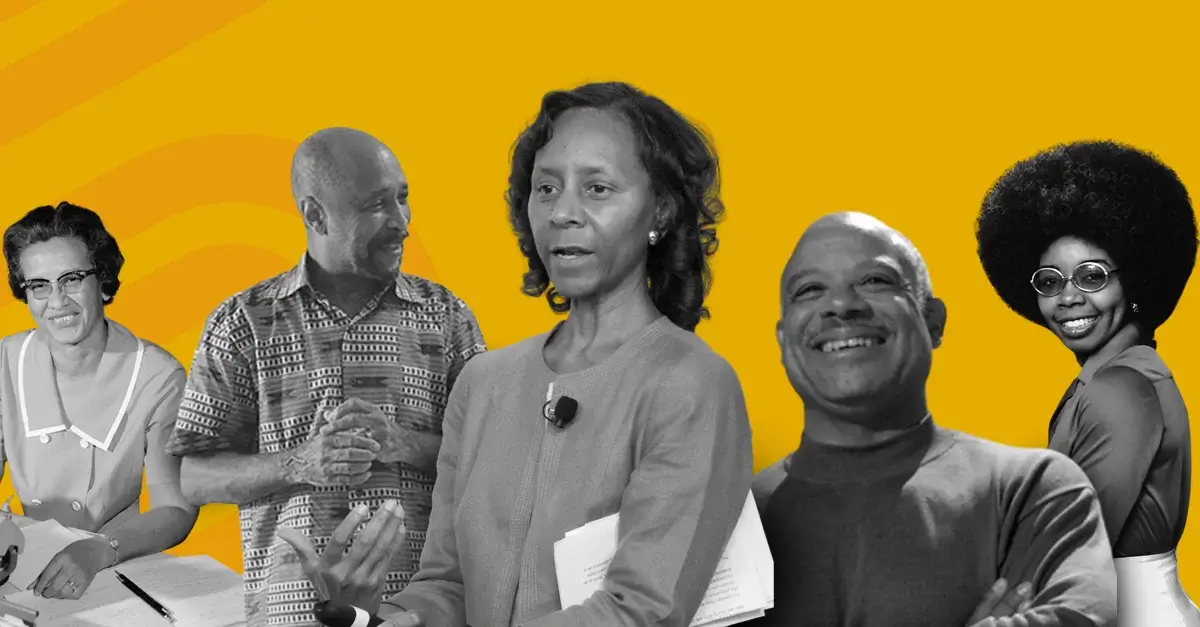These tech pioneers have paved the way for future generations, made massive contributions to hundreds of areas, and impacted the industry as it stands today.

Katherine Johnson
(1918-2020)
Katherine Johnson is probably the most well-known member of this list, and that’s for a good reason. She’s been awarded the Presidential Medal of Freedom by President Barrack Obama, had two NASA facilities named after her, and was portrayed in the Academy Award-nominated film Hidden Figures. She was a mathematician and NASA scientist who played a critical role in the successful launch and return of astronaut John Glenn. Her accurate calculations of orbital mechanics were instrumental in ensuring the safe return of the spacecraft and astronaut. Her work paved the way for future successful NASA missions, and her legacy continues to inspire young women of color to pursue careers in STEM fields.

Mark Dean
(1957- )
Mark Dean is an engineer and computer scientist who helped develop the ISA bus (Industry Standard Architecture system bus) for IBM computers, and later adopted by all major manufacturers at the time, and played a key role in the development of the one-gigahertz processor. The ISA bus was a crucial universal port on the motherboards of PCs that allowed expansion cards, and other devices, to be added to any computer and expand their capabilities. Without these advancements, you gamers out there probably wouldn’t be able to upgrade your graphics cards so easily!

Valerie Thomas
(1943- )
We can all thank Valerie Thomas every time we look at, or take, a picture with our phones, edit something in Photoshop, or stream Netflix. She spent much of her long career as a data scientist at NASA working on digital image formats and processing to allow images from deep space to reach us here on Earth. Add that to breakthroughs in satellite tracking in orbit, the ability to use satellite images to determine and project crop health, and the development of a network of research computers that shaped the modern internet, you begin to see why she’s on this list. Valerie also invented something named the “illusion transmitter,” which more than having a very cool sci-fi name, allowed NASA to send 3D images of objects in a 2D format. The illusion transmitter is still used today by NASA and is also being adapted for use in the medical field, and more.

Marian Croak
(1955- )
Marian Croak began her career, as many of those involved in the early tech industry did, at Bell Labs in the early 1980s. Before the internet as we know it was in existence, she was instrumental in convincing AT&T to use the TCP/IP format for transmitting data over a network, which we still use today. The entire internet is built upon the TCP/IP protocols, which would be enough of an achievement to get you on any list of influential tech figures, but Marian wasn’t finished. She and her team developed VoIP (voice over internet protocol) which allows for digital teleconferencing (like Skype and Zoom), and then later she and a co-inventor created the technology used to donate money through text messages. She was inspired by the text voting system that AT&T built for American Idol, and once the technology was implemented, it was used to raise over $40 million for relief efforts for the 2010 earthquake in Haiti. She’s currently at Google working on responsible artificial intelligence and expanding internet access to the developing world.

Dr. Clarence “Skip” Ellis
(1943-2014)
Clarence “Skip” Ellis was the first African American to receive a PhD in computer science, which for historic firsts, is a massive one. After breaking that barrier in education, Dr. Ellis worked at the famous Bell Labs before joining Xerox’s PARC team and Stanford University to work on the foundations of modern collaborative editing software. If you’ve ever worked on a shared Google Doc where everyone could contribute, you can thank Dr. Ellis and his team. He also worked on teams that pioneered the icon-based graphical user interfaces (GUIs) that we use to interact with all our devices, and object-oriented programming languages (like Python, Java, and C++, just to name a few). Near the end of his life, he helped found the Summer Multicultural Access to Research Training (SMART) program at the University of Colorado Boulder to provide opportunities in science and technology to a more diverse group of students.
These five incredible African-American pioneers in science and technology have made lasting impacts on electronics, software, exploration, humanitarian aid, and so much more. Their innovative work has helped us communicate across the globe, work together collaboratively, see the wonders of the universe, and live the modern connected lives that we enjoy today. It’s important to recognize and honor their contributions, small and large, to the industries that we work in and work around us so that their voices can inspire the next generations of men and women of color. We’re honored to celebrate their achievements during this Black History month, and we hope to carry their inspiration with us throughout the rest of the year.




